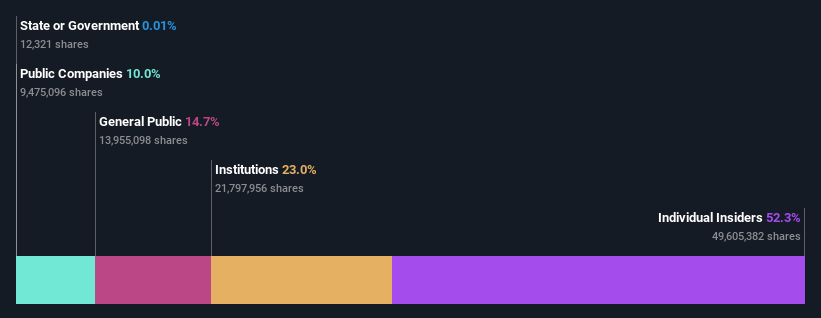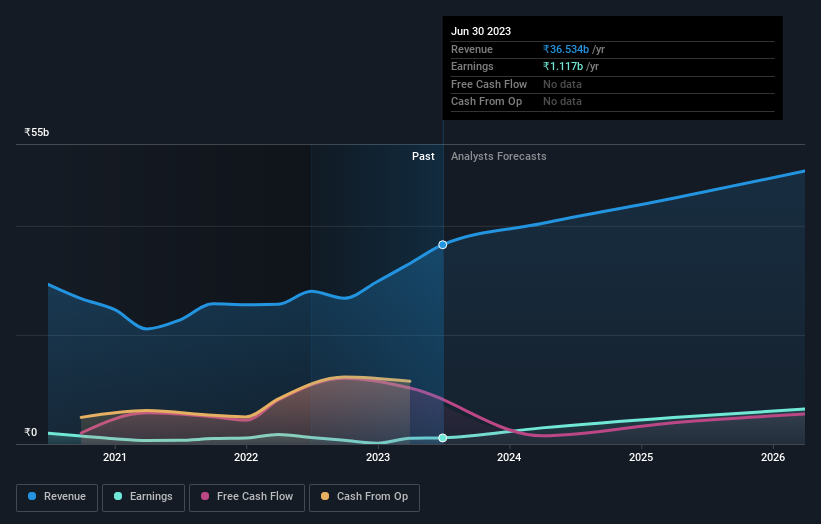- India
- /
- Real Estate
- /
- NSEI:SOBHA
Insiders the biggest winners as Sobha Limited's (NSE:SOBHA) market cap rises to ₹65b

Key Insights
- Insiders appear to have a vested interest in Sobha's growth, as seen by their sizeable ownership
- 59% of the business is held by the top 3 shareholders
- 23% of Sobha is held by Institutions
A look at the shareholders of Sobha Limited (NSE:SOBHA) can tell us which group is most powerful. And the group that holds the biggest piece of the pie are individual insiders with 52% ownership. Put another way, the group faces the maximum upside potential (or downside risk).
As a result, insiders scored the highest last week as the company hit ₹65b market cap following a 12% gain in the stock.
In the chart below, we zoom in on the different ownership groups of Sobha.
See our latest analysis for Sobha

What Does The Institutional Ownership Tell Us About Sobha?
Many institutions measure their performance against an index that approximates the local market. So they usually pay more attention to companies that are included in major indices.
As you can see, institutional investors have a fair amount of stake in Sobha. This implies the analysts working for those institutions have looked at the stock and they like it. But just like anyone else, they could be wrong. It is not uncommon to see a big share price drop if two large institutional investors try to sell out of a stock at the same time. So it is worth checking the past earnings trajectory of Sobha, (below). Of course, keep in mind that there are other factors to consider, too.

Sobha is not owned by hedge funds. Looking at our data, we can see that the largest shareholder is Sobha Menon with 30% of shares outstanding. For context, the second largest shareholder holds about 19% of the shares outstanding, followed by an ownership of 10.0% by the third-largest shareholder. P. N. Menon, who is the second-largest shareholder, also happens to hold the title of Top Key Executive.
To make our study more interesting, we found that the top 3 shareholders have a majority ownership in the company, meaning that they are powerful enough to influence the decisions of the company.
While studying institutional ownership for a company can add value to your research, it is also a good practice to research analyst recommendations to get a deeper understand of a stock's expected performance. Quite a few analysts cover the stock, so you could look into forecast growth quite easily.
Insider Ownership Of Sobha
While the precise definition of an insider can be subjective, almost everyone considers board members to be insiders. Company management run the business, but the CEO will answer to the board, even if he or she is a member of it.
Insider ownership is positive when it signals leadership are thinking like the true owners of the company. However, high insider ownership can also give immense power to a small group within the company. This can be negative in some circumstances.
Our most recent data indicates that insiders own the majority of Sobha Limited. This means they can collectively make decisions for the company. Given it has a market cap of ₹65b, that means they have ₹34b worth of shares. Most would argue this is a positive, showing strong alignment with shareholders. You can click here to see if those insiders have been buying or selling.
General Public Ownership
With a 15% ownership, the general public, mostly comprising of individual investors, have some degree of sway over Sobha. This size of ownership, while considerable, may not be enough to change company policy if the decision is not in sync with other large shareholders.
Public Company Ownership
It appears to us that public companies own 10.0% of Sobha. We can't be certain but it is quite possible this is a strategic stake. The businesses may be similar, or work together.
Next Steps:
It's always worth thinking about the different groups who own shares in a company. But to understand Sobha better, we need to consider many other factors. Like risks, for instance. Every company has them, and we've spotted 3 warning signs for Sobha (of which 1 is a bit unpleasant!) you should know about.
If you would prefer discover what analysts are predicting in terms of future growth, do not miss this free report on analyst forecasts.
NB: Figures in this article are calculated using data from the last twelve months, which refer to the 12-month period ending on the last date of the month the financial statement is dated. This may not be consistent with full year annual report figures.
New: Manage All Your Stock Portfolios in One Place
We've created the ultimate portfolio companion for stock investors, and it's free.
• Connect an unlimited number of Portfolios and see your total in one currency
• Be alerted to new Warning Signs or Risks via email or mobile
• Track the Fair Value of your stocks
Have feedback on this article? Concerned about the content? Get in touch with us directly. Alternatively, email editorial-team (at) simplywallst.com.
This article by Simply Wall St is general in nature. We provide commentary based on historical data and analyst forecasts only using an unbiased methodology and our articles are not intended to be financial advice. It does not constitute a recommendation to buy or sell any stock, and does not take account of your objectives, or your financial situation. We aim to bring you long-term focused analysis driven by fundamental data. Note that our analysis may not factor in the latest price-sensitive company announcements or qualitative material. Simply Wall St has no position in any stocks mentioned.
About NSEI:SOBHA
Sobha
Engages in the construction, development, sale, management, and operation of residential and commercial real estate under the Sobha brand primarily in India.
Undervalued with high growth potential.
Similar Companies
Market Insights
Community Narratives



